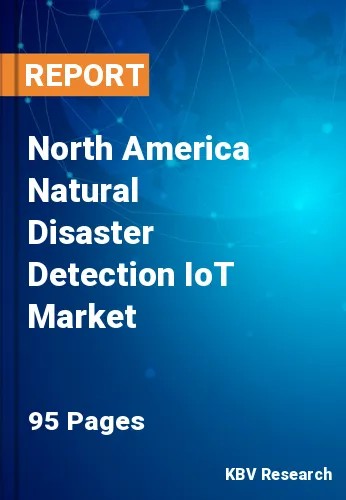The North America Natural Disaster Detection IoT Market would witness market growth of 33.8% CAGR during the forecast period (2022-2028).
Natural and man-made disasters fall under the category of disasters. Natural catastrophes include fire, landslides, floods, cyclones, and tsunamis. Nuclear, mine, chemical, and biological disasters fall under man-made events. The connectivity model called the "Internet of Things" (IoT) envisions a time in the not-too-distant future when everyday objects will be equipped with microcontrollers, broadcasting data transceivers, and the proper protocol stacks to enable interaction and transform a significant portion of the Internet to a corresponding degree.
The information must be shared, expertise and/or experience exchanged, and decisions, acts, and activities organized, for instance, to effectively manage disastrous situations. Also, to carry out difficult tasks like evacuating a crisis area and running actuator operations, a certain set of abilities and experience must be combined during the associate degree emergency.
The frequency of natural disasters is also high In Canada. Roughly 4,000 earthquakes occur annually in this nation and are usually found near the coasts. Landslides happen yearly in the country's hilly areas, like the Canadian Rockies. In addition, tornadoes impact southern Alberta, Quebec, New Brunswick, and Ontario. In the country, there are typically 60 tornadoes every year. In the coming years, many meteorological statistics show that the region will continue to see some of the worst weather and natural disasters. Due to this, the region is dedicated to implementing IoT based natural disaster detection systems, which is beneficial for market growth.
The US market dominated the North America Natural Disaster Detection IoT Market by Country in 2021, and would continue to be a dominant market till 2028; thereby, achieving a market value of $734.1 million by 2028. The Canada market is poised to grow at a CAGR of 36.9% during (2022 - 2028). Additionally, The Mexico market would witness a CAGR of 35.7% during (2022 - 2028).
Based on Component, the market is segmented into Solutions, Hardware and Services. Based on Solutions Type, the market is segmented into Early Warning System & Floating Sensor Network, Lightning Detector System & Acoustic Real-Time Monitoring System and Beacons & Others. Based on Application, the market is segmented into Flood Detection, Wildfire Detection, Weather Monitoring, Earthquake Detection, Landslide Detection and Others. Based on Communication System, the market is segmented into Satellite-Assisted Equipment, First Responder Tools, Vehicle-Ready Gateways and Emergency Response Radars. Based on End User, the market is segmented into Government Organizations, Law Enforcement Agencies, Private Companies and Rescue Personnel. Based on countries, the market is segmented into U.S., Mexico, Canada, and Rest of North America.
Free Valuable Insights: The Worldwide Natural Disaster Detection IoT Market is Projected to reach USD 2.6 Billion by 2028, at a CAGR of 35.3%
The market research report covers the analysis of key stake holders of the market. Key companies profiled in the report include SAP SE, NEC Corporation, BlackBerry Limited, Semtech Corporation, OnSolve LLC, One Concern, Inc., OgoXe, Sadeem Technology and Earth Networks, Inc. (Advanced Environmental Monitoring LLC).
By Component
By Application
By Communication System
By End User
By Country
Our team of dedicated experts can provide you with attractive expansion opportunities for your business.

